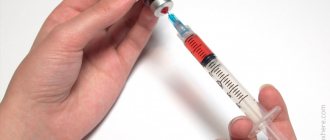Vaccination of German Shepherd puppies is necessary to ensure that they do not contract any infection. Until this time, it is not advisable to take your pet outside and meet other dogs.
Although owners always look forward to this moment, the first vaccination of a German Shepherd puppy should not occur before the baby is 2 months old. In order to develop strong immunity against diseases, you need to follow the rules and vaccination schedule.
Why do dogs need vaccinations?
If newborn puppies receive immunity from their mother's milk, then later they simply need serious protection from serious diseases that can be fatal. This becomes vaccination. The owner decides whether to conduct it or not. The injected drug contains antibodies or weakened viruses, which trigger a defense mechanism and create a reliable barrier against infectious diseases. Immunity is formed, as with infection, but vaccination does not lead to illness. Some of the vaccines are administered once, others require revaccination. Some complex vaccinations are given against several diseases at once. While puppies are fed breast milk, they are protected, but as soon as they switch to a regular diet, any bacteria and viruses become dangerous for them. Therefore, before the procedure, German Shepherd babies are not taken outside.
What vaccinations do German Shepherd puppies get?
Once the German Shepherd reaches two months of age, they begin to vaccinate it. The veterinarian draws up an individual schedule, which can be adjusted due to the puppy’s lag in weight gain and general development.
German Shepherds must be vaccinated against rabies, which is dangerous not only for animals, but also for people. If the vaccine is not given, the owner has many problems: he cannot travel abroad with his pet, take part in competitions and exhibitions, place him in foster care, or bring him to a veterinary clinic for treatment.
Vaccination against distemper is very important for a puppy. It allows you to eliminate infection or at least alleviate the course of the disease. Without it, the pathology spreads very quickly and causes paralysis. Most often the outcome is fatal.
The vaccine against letospirosis will protect Germans from damage to the liver, capillaries, muscles, kidneys, and general intoxication. Viral hepatitis and parvovirus enteritis are no less dangerous. Both diseases are very transient, occur in an acute form and often end in the death of the animal without vaccination.
As an addition to the mandatory list, veterinarians recommend vaccinations against Lyme disease, parainfluenza, piroplasmosis, lichen and coronavirus enteritis.
At what age, with what vaccine and against what should dogs be vaccinated?
The veterinary drug market is filled with a variety of vaccines. New drugs appear from time to time. Prices vary depending on the complex of diseases presented in one dose and the manufacturer.
German puppies are vaccinated against diseases such as:
- Plague of carnivores;
- Hepatitis of infectious origin;
- Parvovirus enteritis (there is no vaccine for coronavirus);
- Adenovirus;
- Leptospirosis;
- Rabies;
- Parainfluenza.
The vaccine is a weakened strain of pathogens. When introduced into the body, it induces the production of specific antibodies. Immunity is developed within 21 days and remains active for a year.
The standard vaccine includes two 1 milliliter bottles. In the first, the drug appears to be a dry, porous mass of pink or yellowish color. The second bottle with liquid contents. This is a vaccine against leptospirosis, rabies or a sterile phosphate-buffered solution. The composition is always indicated on the label. The dry component is dissolved with this liquid. The more diseases a vaccine covers, the more expensive it is.
Important! The drug is stored in the refrigerator and supplied to pharmacies strictly under temperature conditions.
The vaccine is administered to the animal subcutaneously or intramuscularly. The injection site must first be treated with 70% alcohol, and then the injection must be given. But some experts say that you can do without treatment, pricking, relying on the natural protection of the dog’s skin.
When should German Shepherd puppies be vaccinated?
During vaccination, particles of viruses are introduced into the dog's body. The immune system receives a powerful blow, so a number of factors should be taken into account before scheduling it:
- epidemiological situation in the region;
- individual characteristics of the puppy;
- conditions of his detention;
- place of residence.
First of all, vaccination is carried out against major diseases - hepatitis, plague, leptospirosis, enteritis, and later - against rabies.
The timing of the first vaccine, according to the vaccination schedule drawn up by a veterinarian for a German shepherd, is one and a half to two months of age. Don't start too early to avoid causing harm. By this point, she should be absolutely healthy, examined by a doctor and dewormed.
conclusions
Vaccinations are necessary to protect the health and safe development of your puppy. They protect against major diseases, reducing the dog's risk of illness. Vaccines are available and their quality is high. There are different animal vaccination schemes. Pets must be clinically healthy and have previously been dewormed. You need to stick to your vaccination schedule. Revaccination should preferably be carried out with vaccines from the same manufacturer. Information about vaccinations should be included in the veterinary passport with the date of the procedure. The date of the next repetition is written in pencil.
Please follow and like us:
Nikitin Sergey
I write about dogs based on the experience and knowledge gained during my studies as a veterinarian, work in my specialty, and simply from observing my pets.
First vaccination for a German Shepherd puppy, how to prepare your pet
Usually the first vaccination of puppies is carried out by breeders. But if weaning from the mother is early, new owners are vaccinated. After moving, a German experiences stress, so it’s worth waiting a bit with the procedure. As soon as he gets used to it, they begin to prepare. A week before the vaccine is administered, antiparasitic drugs are given:
- Prazitel Plus - does not require a starvation diet, give ½ tablet per 5 kg of body weight.
- Prazicide – effective in the fight against helminths, 1 tablet per 10 kg.
- Albendazole is an effective broad-spectrum drug.
If the puppy is found to have worms, the vaccination is postponed and repeated treatment against parasites is carried out. During the preparation period, you should not change your pet’s diet; you should constantly monitor its general condition (temperature, stool character). If you become lethargic or lose your appetite, you need to see a doctor.
If the epidemiological situation in the region is favorable and the puppy is in good health, he will be vaccinated according to the schedule. The first vaccination is scheduled for early morning, before he eats. Afterwards, the pet is quarantined for two to three weeks. During this time, he should not have contact with other animals, bathe or scratch the injection site. Injections are carried out with drugs intended for dogs up to one year old; vaccinations must be issued by well-known ones, Vanguard, Nobivak and others).
Vaccination rules
According to veterinarians, vaccination against dangerous diseases is a vital procedure, during which a number of rules must be followed.
Vaccination is not prescribed for a sick dog; even if it is slightly unwell, the injection should be postponed until a later date. Although weakened viruses are introduced into the body to provide adequate immunity, unhealthy puppies can become sick, crippled, or even die. When choosing a drug, you should rely on the advice of doctors, and not on the recommendations of forum users or experienced dog lovers. A drug that is well tolerated by one animal can be fatal to another.
If puppies are being vaccinated for the first time or a new biological product has been used, the owner and pet should briefly delay leaving the veterinary clinic. This is necessary in order to monitor the German Shepherd’s reaction to the injection, and if an allergic reaction occurs, to be able to get emergency help.
After vaccination, the puppy is not allowed to swim in open waters, and the entire house is not washed. The site of administration of the biological product is observed for several days. If swelling, abscess or lump appears, consult a doctor.
Where can a German get vaccinated?
The drugs necessary for vaccination are purchased at a veterinary pharmacy, so you can give it to your German Shepherd in different places:
- from the breeder;
- in a veterinary clinic;
- at home.
In the first case, you need to ask the seller to make a note in the documents so that you know the date and name of the drug with which the puppy was vaccinated. Vaccination at home is convenient, but it is impossible to obtain a veterinary passport, without which you cannot travel with your dog or take part in exhibitions.
In the clinic, the German is under the control of specialists, the drug is stored in proper conditions, but the dog feels uncomfortable in a strange place, experiences stress and fear.
The best option is to invite a veterinarian to your home. In this case, you do not have to take the dog to the hospital, there are no unnecessary contacts. But there are some disadvantages - the ampoule must be delivered in a container with ice, which is not always done. There is an additional cost for a specialist visiting your home.
How many rabies vaccines should I give?
This vaccine is given to puppies at the age of 3 months.
There are separate doses or complex vaccinations taking into account additional diseases. Revaccination is carried out every other year. If the likelihood of infection is high, then vaccination is allowed from 8 weeks and mandatory at 3 months. There are many puppy vaccination schedules, and they are designed for the different needs of the breeder. Your veterinarian will choose the best option for you. When purchasing a puppy, it is imperative to find out whether the puppy has been vaccinated and at what age. Based on this information, the owner and the veterinarian are obliged to follow a suitable regimen, which will help avoid problems in the future.
Vaccinations for German Shepherd dogs can be purchased at the pharmacy or at the clinic. Each bottle has an adhesive label indicating the name, manufacturer, expiration date and a list of diseases from which immunity will be formed.
Important! Labels are pasted into the passport with the date of the procedure recorded.
Basic vaccinations for dogs are:
- Nabivak,
- Eurikan,
- Vanguard,
- Hexadog,
- Biocan,
- Duramun and others.
German Shepherd vaccination table by age
Even puppies born from the same German Shepherd have their own individual schedule, with the help of which the owner sees when they were vaccinated and the timing of the next vaccination. This is what a sample graph looks like:
| Type of disease | Vaccination | Periodicity | Timing of revaccination | |
| first | second | |||
| rabies | 3 months | No | annually | after a year |
| plague | 2 months | 4 weeks after the first | ||
| infectious hepatitis | ||||
| parainfluenza | ||||
| leptospirosis | ||||
| parvovirus enteritis | ||||
How to vaccinate a German Shepherd puppy at home?
When there are many puppies and the veterinary clinic is far away, vaccination is carried out on their own. In this case, it is worth keeping a special journal in which the date and name of the drug administered are recorded. You need to prepare in advance and act according to the following scheme:
- Select and buy vaccines by first contacting a veterinary hospital for advice.
- Describe the application diagram.
- Determine the compatibility of biological products with each other.
- Store ampoules at a temperature of +2+8 ⁰С.
- Prepare alcohol (70%), napkins and syringes.
- Visually examine your pet, measure its temperature, make sure it is active and does not refuse to eat.
- Wear disposable gloves.
- Prepare the composition according to the instructions.
- Draw the drug into the syringe.
- Fix the dog.
- Spread the fur at the withers and wipe with alcohol.
- Pull back the skin and insert the needle 1.5 cm.
- Administer the vaccine.
- Gently knead the injection area.
- Enter all data into a log.
- Dispose of vials and syringes.
It should be noted that revaccination is carried out with the same drug as the first vaccination.
The body after the vaccine
After vaccination, your pet may feel unwell - he will be lethargic, may refuse to eat, and his nose will be warm and dry. There is nothing strange about this - the body fights the virus and mobilizes all the forces it has to do so. This period usually lasts less than a day - if you observe a rise in temperature above 390C, you can use an anal suppository to reduce the fever.
The next day, your pupil should be back to normal - he eats, sleeps and behaves as actively as before. If this does not happen and the baby remains lethargic and depressed, contact your veterinarian; a complication may have occurred.
Among the alarming symptoms that indicate a complication may be the following:
- Dyspnea;
- Heavy secretion of saliva;
- Pallor of mucous membranes;
- Respiratory and cardiac arrest;
- Epileptic seizure.
The above signs indicate that the baby has an individual intolerance to the drug. Most often, doctors are able to save the dog - however, this is a reason to take care of a more careful selection of the drug for the next vaccinations.
Caring for your pet after vaccination
After vaccination, the German needs to be closely monitored. Although allergic reactions to injected drugs are rare, caution should be exercised:
- do not use hormonal and antibacterial drugs in the near future;
- do not keep your pet in the open sun;
- do not expose him to stress;
- avoid introducing new foods into the diet;
- don't bathe.
If within two to three days after vaccination a German is apathetic, moves little, and there is a slight increase in body temperature, this is normal. There may be swelling and mild soreness at the injection site. One-time vomiting and loss of appetite are acceptable. During this period, you should not bother your German Shepherd puppy, force him to move and play. He needs to create a calm, comfortable environment, provide him with quality food and clean water.
Contacting a veterinarian is necessary if more alarming symptoms appear in a German:
- complete refusal of food;
- diarrhea for several days;
- increase in body temperature by more than 1 ⁰С;
- inability to swallow;
- paralysis;
- suffocation;
- loss of orientation in space;
- abscess in the injection area;
- pallor of the mucous membranes.
Quarantine for first vaccinated German Shepherds should last at least four weeks - two before vaccination, two after.
Video “Veterinarians on vaccination of puppies”
In this video, your veterinarian will share tips for vaccinating puppies.
Recommended Posts
Standard height and weight of the Cane Corso breed by month
Weight of a puppy and an adult Labrador by month
Weight and height of a German Shepherd puppy by month
38 best dog breeds for apartments according to reviews from breeders and owners
Description and content of the hunting border terrier
TOP 40 best hunting dog breeds with names, descriptions and photos











